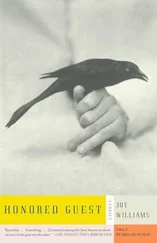Joy Williams - State of Grace
Здесь есть возможность читать онлайн «Joy Williams - State of Grace» весь текст электронной книги совершенно бесплатно (целиком полную версию без сокращений). В некоторых случаях можно слушать аудио, скачать через торрент в формате fb2 и присутствует краткое содержание. Год выпуска: 2011, Издательство: Vintage, Жанр: Современная проза, на английском языке. Описание произведения, (предисловие) а так же отзывы посетителей доступны на портале библиотеки ЛибКат.
- Название:State of Grace
- Автор:
- Издательство:Vintage
- Жанр:
- Год:2011
- ISBN:нет данных
- Рейтинг книги:5 / 5. Голосов: 1
-
Избранное:Добавить в избранное
- Отзывы:
-
Ваша оценка:
- 100
- 1
- 2
- 3
- 4
- 5
State of Grace: краткое содержание, описание и аннотация
Предлагаем к чтению аннотацию, описание, краткое содержание или предисловие (зависит от того, что написал сам автор книги «State of Grace»). Если вы не нашли необходимую информацию о книге — напишите в комментариях, мы постараемся отыскать её.
State of Grace — читать онлайн бесплатно полную книгу (весь текст) целиком
Ниже представлен текст книги, разбитый по страницам. Система сохранения места последней прочитанной страницы, позволяет с удобством читать онлайн бесплатно книгу «State of Grace», без необходимости каждый раз заново искать на чём Вы остановились. Поставьте закладку, и сможете в любой момент перейти на страницу, на которой закончили чтение.
Интервал:
Закладка:
MARTHA’S COFFEECAKE was in a box tied on a little string to the front doorknob, the man says. His bulk is enormous. “She brought you a nice warm coffeecake this morning while you were still asleep. Did you eat it for breakfast?” Kate had not eaten it. “Yes,” she says.
Everyone is there. She looks around at them all but their eyes are settled on something on the ground. She looks at the ground too but can see nothing extraordinary. The grave is a mess. The ground is frozen and the hole is ragged. The hole looks more like an act of God than anything men would think of doing with a plan and shovels besides.
The Reverend is talking about the grave, how deep and insatiable it is, just like the barren womb. It’s never satisfied, he is saying. There are three things that are never satisfied and there are three things that are wonderful and there are three things which disquiet the earth and there are three things that go well. The child agrees, moving her small dark head as he speaks, making everyone want to cry out and rescue her from her false and awful comprehension.
But the child is thinking a harmless thought. The world’s in her head. They’ve filled up the hole and the dirt on top is soft and black. They’ve trucked it here. The child is thinking about the land behind the gas station where the Hanson twins burn tires. The ground is springy from the rubber … it’s like a trampoline. She is thinking about that is all, how nice it is.
The service is over. The child runs to her father. She rocks and dreams in her father’s side. In the sea, the buoys ring and the sun slips from the afternoon toward warmer lands. She brings back the dream she has learned. It is delicate and brutal, brief and interminable; she can call it back any time she wishes. It lasts no more than a second, being, at the least, no more than one single shouted and preposterous word and being less word than the witless weight of joy. She stands on one boot on the bluish ice and dreams.
People try to interrupt her. Women in old furs are kissing and handling her. They make a ring around her and crouch, patting and joggling her, grasping her tightly. The child suffers this for she knows that they are inevitable. She knows that they are Christian and are being saved. When they go home after church on Sunday, they change into white gowns that are like wedding gowns and sit in shadowy living rooms, watching the door, waiting for the kingdom to come.
It is snowing. Everywhere an apocalyptic absence of light. A dangerous day of God’s. The snow falls and shines in the women’s fur collars. It falls upon the bright flowers banked upon the ground. The child is holding a flower in one unmittened hand. She squeezes it again and again. It feels very odd; it feels very wrong like the soft rubber stomach of a doll. She plans to bring it home and place it in the drawer where she keeps all her treasures.
The wind howls in from the sea. The congregation would invalidate her dream if they could, but they don’t know all the facts. The child is neat and polite, distant, old-fashioned in her manner. The people are uneasy as they wait and stamp in the snow. Perhaps they are even annoyed, even though the child poses no threat to anything except what they believe to be her own maidenish future.
The mourners separate and get into their cars. They travel up to the parsonage, meeting no one else on the road. Everyone is among them. They follow the curve of the sea which is high and yellow. It is the aftermath of a weekend storm. A flock of eiders move heavily into the wind and then change course, surrendering. The sky is white and the water is yellow. The birds vanish. It is an ugly day. The child sits beside her father, her hand in his pocket. He has some coins in there and his pipe, the bowl of which is still warm.
“Look at the ruin on the wrack,” the child says, using her other hand to point at the beach. Her father smiles and the child laughs a little. It is an old joke that she has made up. She can’t keep herself from saying it even though she knows that she has exhausted its possibilities. She looks at her father gratefully for having acknowledged it once again.
They arrive at the big house. The child follows her father inside. Relatives and congregation troop in behind them. Everyone takes off his boots and places them on newspapers put down by one of the thoughtful. Later that evening, several of the ladies present will insist that their own boots have been taken and strange boots left in their place. They will claim this because they cannot get their feet into these boots. Actually this is not what has happened. Their feet have swollen in the heat of the house. There are fires in several of the fireplaces and the big stove is burning as well. There are breads and cakes baking in it and on top are pots of coffee and soup. The place looks festive with all the lamps shining and the food and the women moving officiously about. The child lingers on the stairway. She feels invisible. She makes a face. Upstairs she hears a noise.
THE ROCKING CHAIR is rocking in the draft. No one’s in it which means a death. The child thinks of her mother, upstairs, in the month before she died. The child dabbles with the thought that she is still there but it doesn’t really engage her imagination. The woman had been alone in that room for so long. What difference would it make if she was there still? The child sometimes had brought up a few toys and watched her. The woman moved around the bed, smoothing blankets. She moved about the room, breathing wearily, touching her breasts, caressing her stomach. Often, then, the child had seen the baby stretch, the head bubble up, the mother’s stomach bunch and sag grotesquely. She had seen this before. Where had she seen the likes of this before? The shuddering yawn. The reluctant host carrying continence. When? She is a child, not even eight years old.
She had watched the woman in the room. Everything was bare. The light sockets were empty. The door had been taken off its hinges and was gone. The woman spent hours at the single window that overlooked the field. She pressed her breasts against the icy glass. She pressed her lips against the glass; she gnawed with her nails on the frost, putting down words, things, pictures. From the hall, the child saw them. They made no sense. Perhaps it had been an elaborate code, done in reverse, decipherable only from outside, from the field. Perhaps it had been mirror writing like Da Vinci’s. The child had not investigated. It had been too exciting. She is just a child and she enjoys mystery and secrets and disastrous forebodings.
On the rim of the field is a snake fence. The field was always empty, one couldn’t even see the wind move across it, but once, one morning very early, the child, again standing in the hall, saw tracks curving deeply across the snow there, as though something hungry but harmless had closed its jaws over the land. The day’s ice storm obliterated them and they were never there again.
The child had imagined the woman behaving as though she were a prisoner in the house, suffering terribly and devising fruitless plans for escape. But how could this be? The woman was only her mother and she had planned to have a baby. She was merely “lying in.” Naturally this has never been a prison house. It is a home. Like any other. There are cookies in the kitchen, for instance. In a china crock poorly rendered as a bear. There are little maxims scattered throughout: HANG IT HERE AND LET ME HOLD YOUR TEABAG and there is a spice and herb chart and a welcome mat and other homely objects, patent leather bags and night cream and paregoric and mayonnaise and seed bells for the birds.
The woman had always been free to go. Yet in that month, she never left that room which she had chosen for herself, except at night. They, the child and the father, had suspected this long before it became apparent in one terrible incident. She used her house then when she thought that they were sleeping. They would hear the toilet being flushed or note that some of the food was missing. They would never hear her actually. Only the sounds of her ablutions. Secretive. Functions. In the old house were many sounds. All of them could not be heeded. At night she wandered. That had been their conclusion. She did the small housewifely chores she felt were imperative. It had no doubt been relaxing for her. And respecting her whims, they had let her be and not confronted her with themselves. But they had never been certain that she rose when they retired until the night they heard the scream. It was in the kitchen. She had been ironing and there had been an accident. She didn’t get enough sleep, she confessed. She was becoming absent-minded. By the time the Reverend reached her, she was quite in control of herself. She’d put a stick of butter on it. She had also picked up the iron from the floor. She worried about the burn in one of the tiles there more than she bemoaned the burn on her face. It had taken in a good part of her right cheek and chin. White as a flounder. The child had never seen anything so white. It went beyond sickness. It was the deep trauma of the flesh.
Читать дальшеИнтервал:
Закладка:
Похожие книги на «State of Grace»
Представляем Вашему вниманию похожие книги на «State of Grace» списком для выбора. Мы отобрали схожую по названию и смыслу литературу в надежде предоставить читателям больше вариантов отыскать новые, интересные, ещё непрочитанные произведения.
Обсуждение, отзывы о книге «State of Grace» и просто собственные мнения читателей. Оставьте ваши комментарии, напишите, что Вы думаете о произведении, его смысле или главных героях. Укажите что конкретно понравилось, а что нет, и почему Вы так считаете.












